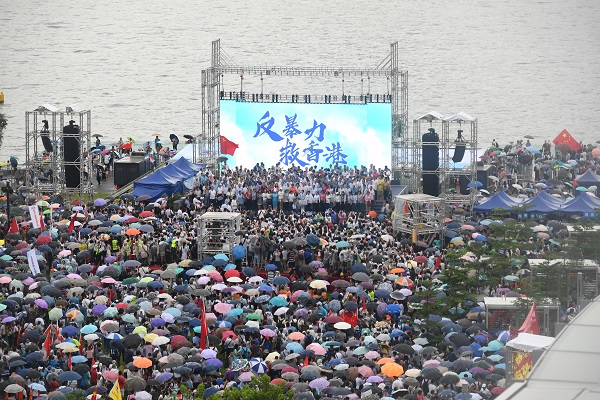Hong Kong, A mass rally in Hong Kong on Sunday, widely deemed the most important so far this month, attracted tens of thousands of people as the crisis entered the 11th consecutive weekend of anti-government protests.
All eyes were on whether the rally, which had been peaceful throughout the afternoon, would devolve into violent clashes between police and protesters as has been the case in the ongoing protests in the semi-autonomous Chinese city, currently in the throes of a deepening political crisis, the Efe news reported.
The rally was officially confined to Victoria Park, the city’s biggest public park, but demonstrators defied authorities and turned it into an unlawful march covering different parts of Hong Kong Island not long after it kicked off.
By early evening, various districts were thronged with people who spilled out from the park in different directions, marching on major roads, tramways and side streets.
At around 6 p.m. riot police reportedly began to appear in various locations, including near the Liaison Office, an organ of Beijing in Hong Kong.
In recent days this rally has been the focus of attention in Hong Kong, with many expecting a high turn-out amid rumours that people from mainland China had crossed the border to infiltrate the crowds and cause trouble.
There were also fears the police could up its ante by deploying water cannon to crack down on protesters.
Now TV reported Sunday that two water cannon vehicles had left their base in a suburban town and been moved to Hong Kong Island as a precautionary measure.
The city’s embattled police force was the leading subject of criticism at the rally, held under the theme of “Stop gangster violence, curb police chaos.”
The recent wave of anti-government protests, sparked by a controversial extradition bill, have prompted widespread criticism of the police for their alleged brutality against protesters.
Speaking to the crowd at the event, Wong Yik-mo, vice convenor of the Civil Human Rights Front that organised the rally, mentioned how pro-democracy activists had been smeared by a law enforcement force that is supposed to be politically neutral.
“The Junior Police Officers’ Association and some pro-Beijing legislative councillor have repeatedly called protesters �cockroaches.’ It brings up the painful memories of genocide [for] both Hongkongers and the international community,” said Wong.
During the 1994 Rwandan genocide about one million Tutsis and moderate Hutus were killed in three months. The most radical Hutus had called the Tutsis “cockroaches.”
Earlier the Hong Kong government issued a statement expressing “regret” that the Civil Human Rights Front targeted police as the slogan of the rally.
The Civil Human Rights Front was behind two high-profile demonstrations in June that drew millions of Hongkongers to protest against a controversial extradition bill. Shortly after the demonstrations, the government announced the bill’s suspension.
Rallies organised by the front often attract huge turnouts, partly because the group is affiliated with almost all pan-democratic camps in Hong Kong and can therefore pull a crowd of peace-loving as well as more radical protesters.
The rally was intended to be a march from Victoria Park to Central, Hong Kong’s central business district, but police rejected the front’s plan and only gave permission for a rally in the park, effectively making it illegal for people to march beyond the area.
At around 3.30 p.m., 90 minutes after the rally officially kicked off, the heavens opened as the protesters went to leave the park, turning it into a huge canopy of umbrellas.
Those marching risked being charged with unlawful assembly, which carries a maximum of five years in prison.
The rally came exactly one week after Hong Kong’s police launched an unusually heavy-handed operation to clear protests in various districts, and five days after a sit-in at Hong Kong International Airport descended into violent clashes between police and protesters.
Since June, Hong Kong has been rocked by a wave of protests because of the extradition bill, which would have enabled fugitives to be extradited from Hong Kong to mainland China.
Though the bill has been declared “dead” by the city’s top leader Carrie Lam, the civil campaign against it has since morphed into a broader movement seeking to reverse a general decline in freedoms and investigate police brutality.










